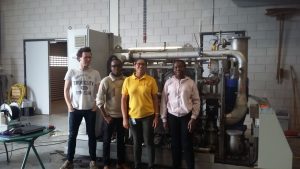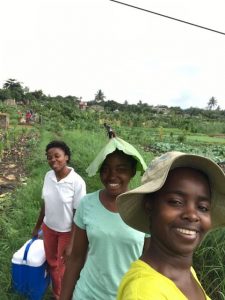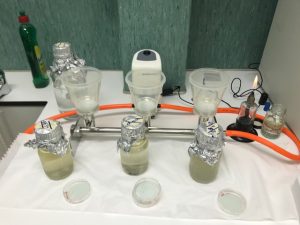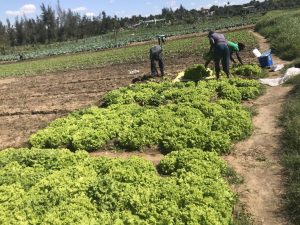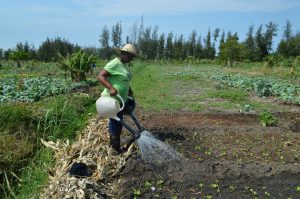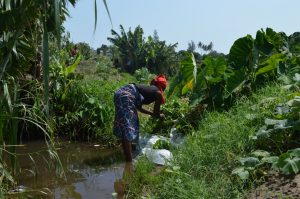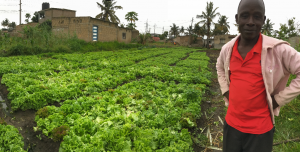by Noor, Celma, Natalia and Adriano
This is a long-due update on project activities. Each one of our PhD students wrote a short summary of the activities done in the previous months.
Noor’s progress
The last activities of Noor’s work included the submission of the second paper entitled “Use of reclaimed water for non-reinforced concrete blocks production for self-construction of houses in Maputo”. In this paper the main findings was that the effluent of Maputo’s wastewater treatment plant is a potential source of mixing water for concrete production with the final product being of equivalent quality in terms of strength and durability of that produced with drinking water.
Noor working in the lab at TU Delft.
Following she spent some time in the laboratory performing tests for proof of concept involving ceramic membrane filtration for direct water reclamation with main focus on water softening. The generated data is being analyzed at the present. Parallel to this work a training on the operation of a ceramic membrane pilot plant was attended together with 2 Mozambican and one Dutch BSc students. The pilot plant is being transported to Maputo and will be used for demonstration in treatment of wastewater for reuse in cooling systems.
Celma’s progress
This year has been really wonderful for Celma. The first article has been submitted and it is under revision. It is a review on “Use of (partially) treated municipal wastewater in irrigated agriculture in sub-Saharan Africa: potentials and constraints”. The article, highlights the potential for water reclamation for African countries and the need to adjust the irrigation practices and cost-effective technologies to treat wastewater to desirable levels.
Team work!
Celma has spent most time in field work and had opportunity to interact with farmers from Infulene valley and vendors from Markets in Maputo. They are the key persons for the implementation of her work. Her work focus in water quality assessment for use in microbiological quantitative risk assessment and nutrient balance for wastewater evaluation as a source of nutrients. The main activities comprised sampling and lab work. Samples were collected from irrigation water, soil and lettuce in farms and market in Maputo. Part of those sample was analysed at the Centre of biotechnology and at the water laboratory of the Faculty of Civil Engineering from the Eduardo Mondlane University. Currently data is being analysed for the Quantitative risk assessment. A preliminary conclusion from the gathered data is that the irrigation water source does not have a relation to the potential contamination in the market. Other samples for quantity assessment are being analysed at the Faculty of Agronomy and forestry Engineering.
Natalia’s progress
After a first period of fieldwork, Natalia is currently back in Delft analysing the data collected in Infulene. During this first phase in Maputo, she focused in interviewing farmers and observing their practices around water in four farmers’ associations. Guided by the question of how the materiality of water – in terms of quantity and quality – contributes in shaping the social organization of farming at machamba level, she mapped the water sources, its flow through canals, ditches and farms; and documented the farmers’ perceptions and practices around it. Even though water is transversal to all of the conversations, once analysing the data, Natalia came to the preliminary conclusion that its materiality is not as central to the organization of farming in Infulene as initially thought.
The lush Infulene Valley is a beautiful place to work in.
Together with the pollution of water, there are other threats faced by the machambas, for example the pressure on land resulting from the city’s rapid urbanization process and the respective urban planning, which does not consider urban farming, the prioritization of sanitation over irrigation in water interventions, and the growing number of urban farmers corresponding with Maputo’s shrinking employment market. It triggered her curiosity to unravel why these farmers – particularly the female farmers – remain working in Infulene facing all of the mentioned adversities and challenging political and economic discourses that describe small-scale farming in Mozambique as in perpetual decline. Having this context in mind, Natalia is planning a second fieldwork period in Maputo, now trying to focus in exploring the relation of the machamba – at the smaller and scale – and Infulene Valley with the cities of Maputo and Matola.
Adriano’s progress
Adriano has just submitted for publication his first article draft entitled “Governing through sanitation: naturalizing differences in Maputo City, Mozambique (1887-2017)”. The paper mobilizes historical analysis to understand the foundations of contemporary sanitary inequalities and distributions of environmental risks, and to explain its persistence in present Maputo city. It illustrates that projects of drainage and land reclamation in the colonial city created the clean, dry and sanitary habitats for the privileged white few, but also the wet, unhealthy and filthy spaces deemed good enough for the less white majority. The paper concludes that uneven sanitary conditions in Maputo city are not natural, are the result of a specific way of exercising power through sanitation that worked and works to normalize and naturalize a particular ordering of both populations and environment, privileging certain categories of people in detriment of others. Current masterplans plans tend to overlook these inequalities, or accepts them as givens and ‘natural’ conditions.
Currently, Adriano is completing his ethnographic analysis of the sociomaterial production of sanitation civilities in the contemporary city. The paper documents everyday struggles of urban residents of Chamanculo and Bairro Central and practices around storing and expelling dirty water, to keep one’s body, home and living environment clean. The paper claims that sanitation is not just technical or medical, it’s also cultural and political. It reveals that sanitation is an important site for the enactment and construction for civility. Resident’s struggles to be sanitary in urban contexts without so many infrastructures are deeply collective and requires continuous negotiations and hard work. Preliminary findings of this work were presented during the 2019 Annual International Conference of the Royal Geographical Society, held last August in London, where Adriano made an oral presentation entitled ‘Sanitary civility, wastewater flows and everyday negotiations of coexistence in Maputo City, Mozambique”.


